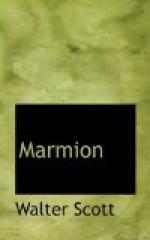line 161. By a victory gained at Maida, 6 July 1806, Sir John Stuart broke the power of the French in southern Italy.
line 163. ‘The Daoine shi,’ or Men of Peace, of the Scottish Highlanders, rather resemble the Scandinavian Duergar, than the English Fairies. Notwithstanding their name, they are, if not absolutely malevolent, at least peevish, discontented, and apt to do mischief on slight provocation. The belief of their existence is deeply impressed on the Highlanders, who think they are particularly offended at mortals, who talk of them, who wear their favourite colour green, or in any respect interfere with their affairs. This is especially to be avoided on Friday, when, whether as dedicated to Venus, with whom, in Germany, this subterraneous people are held nearly connected, or for a more solemn reason, they are more active and possessed of greater power. Some curious particulars concerning the popular superstitions of the Highlanders may be found in Dr. Graham’s Picturesque Sketches of Perthshire.’—Scott.
Friday (the day of the goddess Freya) is regarded as lucky for marriages. Mr. Thiselton Dyer in ‘Domestic Folk-lore,’ p. 39, quotes the City Chamberlain of Glasgow as affirming that ’nine-tenths of the marriages in Glasgow are celebrated on a Friday.’ In Hungary nothing of any importance is undertaken on a Friday, and there is a Hungarian proverb which says that ’whoever is merry on a Friday is sure to weep on the Sunday.’ The Sicilians make the exception for weddings. In America Friday is a lucky day-the New World, no doubt, upsetting in this as other matters the conservatism of the Old. The superstition of sailors about Friday is famous. Cp. the old English song ‘The Mermaid.’ For further discussion of the subject see ’Notes and Queries,’ 6th S. vol. vi.
line 175. ’The journal of the Friend, to whom the Fourth Canto of the poem is inscribed, furnished me with the following account of a striking superstition:—
’"Passed the pretty little village of Franchemont (near Spaw), with the romantic ruins of the old castle of the counts of that name. The road leads through many delightful vales, on a rising ground: at the extremity of one of them stands the ancient castle, now the subject of many superstitions legends. It is firmly believed by the neighbouring peasantry, that the last Baron of Franchemont deposited, in one




